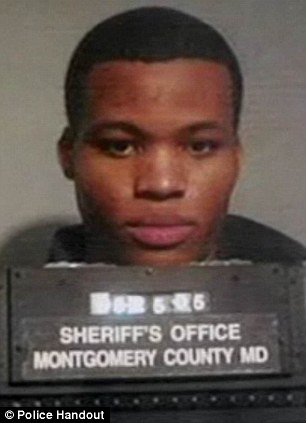Judge to Hear D.C. Sniper Malvo’s Challenge to Life Sentences in Maryland
Alison Knezevich, Baltimore Sun, June 14, 2017
A Montgomery County judge is set to hear arguments Thursday in a case challenging the life sentences given to a man who pleaded guilty in the 2002 sniper attacks that terrorized the Washington area.
Lee Boyd Malvo, 32, claims the six life-without-parole terms he received in Montgomery County have been rendered illegal by U.S. Supreme Court decisions saying mandatory life-without-parole sentences are unconstitutional for juveniles except in rare cases.

Lee Boyd Malvo
His case is the most high-profile of a number of challenges to such sentences throughout Maryland.
Malvo was 17 when he took part in the attacks that left 10 people dead and three wounded in Maryland, Virginia and Washington. His accomplice, John Allen Muhammad, was 41 at the time. Muhammad was executed in 2009 in Virginia.
Six of the killings happened in Montgomery County. Victims were going about their daily lives — mowing a lawn, pumping gas, vacuuming a minivan, for example — when they were shot.
Last month, a federal judge in Virginia ruled the life sentences Malvo received in that state must be reconsidered in light of the Supreme Court rulings, which came after Malvo was sentenced. The Virginia attorney general plans to appeal that decision.
In Maryland, Malvo filed a motion seeking a new sentence in January, and the hearing is set for Thursday in Montgomery Circuit Court. Malvo pleaded guilty to six counts of first-degree murder in 2006.
Malvo will be represented by James Johnston, who directs Maryland Office of the Public Defender’s Youth Resentencing Project. The office filed a number of motions seeking new sentences in cases around Maryland for people serving lengthy sentences who were juveniles at the time of their offenses.
“Lee Malvo is no less deserving of a new sentencing simply because it is a high-profile case,” said Johnston said. “We’ve asked for a new sentencing hearing and that is what we believe Mr. Malvo is entitled to receive, just like every other juvenile serving life without parole in Maryland.”
He said the Supreme Court decisions mean Malvo and others should have the opportunity to present mitigating evidence and “highlight the fact that children are constitutionally different from adults.”
“Children make poor, impulsive choices, children do not control their own environments, and, most importantly, children have the capacity for change,” Johnston said.
{snip}















